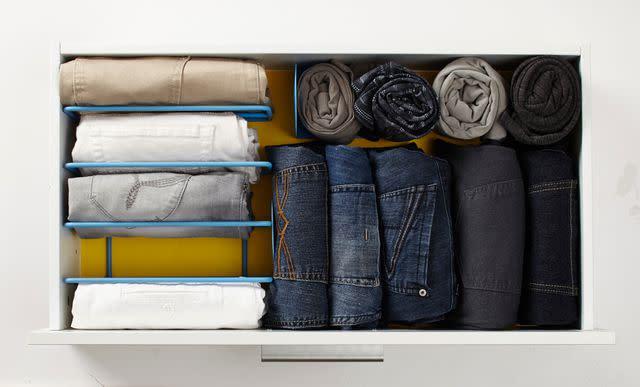How Often Should You Wash Jeans?
Cleaning and laundry experts weigh in on the denim-washing debate.
We're all guilty of it—going a few days or maybe even more without washing our jeans (don't worry, we won't tell). Oftentimes, the lack of laundering is justified by not wearing the pair often, or wearing them so often that we can't stand to be without them for a day or two.
Like with most cleaning routines, everyone has their own set of rules they rarely stray from. But despite what you might think is best practice, there's actually an answer as to how often you should be washing your jeans, provided by cleaning experts.
Meet the Experts
Mary Gagliardi (aka “Dr. Laundry”), Clorox's in-house scientist and cleaning expert, Jennifer Cosco, founder of MomRemedy, and Jennifer Ahoni, P&G's fabric care principal scientist, all gave us their professional opinion on the semi-controversial debate of how many wears until someone should wash their jeans—along with a few other expert laundry tips to help prolong the life of your denim.

Adam Albright
So, How Often Should You Wash Your Jeans?
Like most things in life, the answer to how often to wash jeans isn't black and white. It depends on a few factors based on your personal preferences and lifestyle. Here's what to consider.
Usage and Wear Time
Depending on how you like the color and fit of your jeans, Gagliardi suggests washing the denim frequently, after one or two wears if your goal is overall color retention. To preserve the color even more, wash them inside out and in cool water.
For a little added fading or lightening, wash them right-side out and in warm water. Gagliardi says this is ideal for people who are hard on the exterior of their jeans and want to get them fully clean but don't mind if they lose some color.
Ahoni says that some clothes can be dirtier on the inside than on the outside as a result of body soils and environmental odors. This is especially true of jeans since the body areas they cover include a lot of skin and our excretory and reproductive systems.
"Wash after three wears to prevent odor buildup. If you're sweating excessively while wearing, be sure to wash after that wear. If you spill on your favorite jeans, try to wipe away the food before it turns into a stain, or spot-treat a stain on your jeans," Ahoni says.
Cosco recommends washing jeans every four to six wears to preserve their color and shape. However, she says it’s important to consider personal preference. If you prefer a more relaxed fit and a faded appearance, you can increase the washing cycle to around every two to three wears.
Related: How Often Should You Wash Towels? You Might Not Be Doing It Enough
Bacteria and Odor Concerns
While bacteria can be present in unwashed jeans, it's not the only thing that causes odors on clothes, Ahoni says. She states that over the course of one day, the average adult produces 1 liter of sweat, 10 grams of salt, 40 grams of sebum, and 10 grams or 2 billion skin cells.
"Dead skin, sebum, and other body soils like urine, feces, semen, and vaginal secretions can remain on jeans if they are not washed often. These have to be washed off using a deep-cleaning detergent, like Tide," Ahoni says.
Related: How to Sanitize Laundry to Disinfect Clothing, Linens, and Fabric

Jacob Fox
Does Washing Jeans Too Often Damage Them?
"Washing jeans after every wear can cause quicker color fading and wear and tear. If you're aiming to maintain that fresh, just-bought look, it's a great idea to opt for spot cleaning when necessary, and simply air out your jeans when they need it," Cosco recommends.
In cases where organic matter has built up on the jeans' surface, Gagliardi says that washing jeans does not cause any more damage to them than wearing them.
"Soil isn’t obvious on darker jeans because the uneven surface of denim’s twill weave doesn’t easily show dirt—but it does interact with the dye on the fabric, contributing to fading. Frequently washing jeans before the soil has a chance to build up on the fabric means less aggressive cleaning methods (like cold water instead of warm or hot) will still get them clean," Gagliardi says.
Related: 7 Common Laundry Mistakes That Can Damage Clothes
Best Jean-Washing Protocol
For the most color-retaining wash, Gagliardi says to turn the pair of jeans inside out, close the zipper or button the fly, and wash them on a regular cycle with cold water. She says to use a good detergent and use an additive for colors, if desired. Wash with other dark items to avoid problematic dye transfer. Hang the jeans to air-dry rather than putting them in the dryer.
If you want your jeans to lighten, increasing the wash water temperature and tumble drying them will produce a faded appearance. Washing jeans right-side out also increases fading because of abrasion on the surface of the fabric as the jeans agitate against other items in the wash load.
Related: Can You Wash Whites with Colors? Here's What an Expert Says
Ahoni advises to always read the fabric care label in case of any specific washing instructions. If you're concerned about the jeans being abrasive to delicate items, wash the denim in a separate load. To minimize shrinking, you can also wash the jeans on a delicate cycle of their own. If you want to protect the jeans against fading, fuzzing, and stretching, try using a fabric conditioner in addition to your detergent.
Hand-Washing Jeans
Some jeans require being washed by hand. In this instance, Ahoni says to fill a tub or sink with cool or warm water and add detergent. Add the jeans, swishing them around in the water for 1-2 minutes. Let them soak for 15-30 minutes, then drain any dirty water, leaving the jeans in clean water for another 5-10 minutes to soak. Use your hands to move them around to get rid of any excess dirt or detergent. Remove excess water and follow label instructions for drying.
The Verdict
The sweet spot for washing jeans seems to be right around three wears, but it depends on the desired fit and color of your jeans, and how much you dirty them in your daily life. Fading can occur from both wear and tear of your everyday routine, or from washing your jeans often—so the exact amount of wears between washes depends on your personal preference.
For more Better Homes & Gardens news, make sure to sign up for our newsletter!
Read the original article on Better Homes & Gardens.

